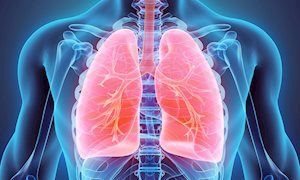22 August 2019
This study shows that everolimus-related ILD occurs frequently. Prospective monitoring of DLCOc in combination with measurement of serum SP-D and YKL-40 appear useful to discriminate ILD from other causes of respiratory symptoms.
Everolimus-related interstitial lung disease (ILD) (also: pneumonitis) poses a difficulty for physicians, as it is hard to discriminate ILD from other causes of respiratory symptoms and to decide on safe treatment continuation.
Objective
We investigated the capability of pulmonary function tests (PFT), plasma biomarkers, everolimus pharmacokinetics, and FDG-PET to discriminate between everolimus-related ILD and other causes of respiratory problems and to predict the severity of ILD.
Patients and methods
Women starting treatment with everolimus plus exemestane for advanced breast cancer were included. At baseline and during the first 3 months, respiratory symptoms, PFT with diffusion capacity of the lungs for carbon monoxide corrected for hemoglobin (DLCOc) and forced vital capacity, serum plasma biomarkers (including SP-D and YKL-40), everolimus trough concentration, and 18F-FDG-PET were prospectively recorded.
Results
Twenty-seven (out of 29 included) patients were evaluable for analysis. Fifteen patients (56%) developed everolimus-related respiratory signs or symptoms and four patients (15%) needed everolimus discontinuation and received corticosteroids. Change in DLCOc differentiated ILD from alternative diagnoses with 0.91 sensitivity and 0.78 specificity. Decrease in DLCOc (non-significant) was greatest in patients who needed everolimus discontinuation. Serum SP-D and YKL-40 could differentiate ILD from alternative diagnoses with 0.83 and 0.83 sensitivity, and 0.85 and 0.62 specificity, respectively. 18F-FDG-PET abnormalities did not precede clinical symptoms. No relationship between ILD and everolimus trough concentration was found.
Conclusions
This study shows that everolimus-related ILD occurs frequently. Prospective monitoring of DLCOc in combination with measurement of serum SP-D and YKL-40 appear useful to discriminate ILD from other causes of respiratory symptoms. Clinicaltrials.gov identifier: NCT01978171.
Willemsen AECAB, Tol J, van Erp NP, Jonker MA, de Boer M, Meek B, de Jong PC, van Moorsel C, Gerritsen WR, Grutters JC, van Herpen CML.
Annelieke Willemsen and Carla van Herpen are members of theme Rare cancers.

This study shows that everolimus-related ILD occurs frequently. Prospective monitoring of DLCOc in combination with measurement of serum SP-D and YKL-40 appear useful to discriminate ILD from other causes of respiratory symptoms.
Abstract
BackgroundEverolimus-related interstitial lung disease (ILD) (also: pneumonitis) poses a difficulty for physicians, as it is hard to discriminate ILD from other causes of respiratory symptoms and to decide on safe treatment continuation.
Objective
We investigated the capability of pulmonary function tests (PFT), plasma biomarkers, everolimus pharmacokinetics, and FDG-PET to discriminate between everolimus-related ILD and other causes of respiratory problems and to predict the severity of ILD.
Patients and methods
Women starting treatment with everolimus plus exemestane for advanced breast cancer were included. At baseline and during the first 3 months, respiratory symptoms, PFT with diffusion capacity of the lungs for carbon monoxide corrected for hemoglobin (DLCOc) and forced vital capacity, serum plasma biomarkers (including SP-D and YKL-40), everolimus trough concentration, and 18F-FDG-PET were prospectively recorded.
Results
Twenty-seven (out of 29 included) patients were evaluable for analysis. Fifteen patients (56%) developed everolimus-related respiratory signs or symptoms and four patients (15%) needed everolimus discontinuation and received corticosteroids. Change in DLCOc differentiated ILD from alternative diagnoses with 0.91 sensitivity and 0.78 specificity. Decrease in DLCOc (non-significant) was greatest in patients who needed everolimus discontinuation. Serum SP-D and YKL-40 could differentiate ILD from alternative diagnoses with 0.83 and 0.83 sensitivity, and 0.85 and 0.62 specificity, respectively. 18F-FDG-PET abnormalities did not precede clinical symptoms. No relationship between ILD and everolimus trough concentration was found.
Conclusions
This study shows that everolimus-related ILD occurs frequently. Prospective monitoring of DLCOc in combination with measurement of serum SP-D and YKL-40 appear useful to discriminate ILD from other causes of respiratory symptoms. Clinicaltrials.gov identifier: NCT01978171.
Publication
Prospective Study of Drug-induced Interstitial Lung Disease in Advanced Breast Cancer Patients Receiving Everolimus Plus Exemestane.Willemsen AECAB, Tol J, van Erp NP, Jonker MA, de Boer M, Meek B, de Jong PC, van Moorsel C, Gerritsen WR, Grutters JC, van Herpen CML.
Annelieke Willemsen and Carla van Herpen are members of theme Rare cancers.
Related news items

KWF grant for better selection of individuals and lung nodules in lung cancer screening
1 November 2021 The Dutch Cancer Society has awarded the consortium project ‘Multi-source data approach for Personalized Outcome Prediction in lung cancer screening’ with a grant of 1,425,000 Euro. Colin Jacobs will lead the work package on using artificial intelligence for accurate risk estimation of lung nodules. go to page
Radiation boost lowers risk of prostate cancer recurrence
21 January 2021 An additional external-beam radiation dose delivered directly to the tumor can benefit the prospects of men with non-metastatic prostate cancer, without causing additional side effects. The risk of relapse within five years for these men is smaller than for men who did not receive this boost. go to page
Cognitive behavioral therapy reduces severe fatigue in patients with advanced cancer during treatment
28 January 2020 In Annals of Oncology, RIHS researchers Hanneke Poort, Marlies Peters, Winette van der Graaf, Ria Nijhuis-van der Sanden and colleagues showed significant effects of cognitive behavioral therapy on fatigue in patients with advanced cancer during treatment with palliative intent. go to page
Sarah Verhoeff wins audience award Radboud Talks Jury chose neuroscientist as overall winner
26 March 2019 The winner of the fifth edition of scientific pitch competition Radboud Talks is Suhas Vijayakumar, PhD candidate at the Faculty of Social Sciences and the Donders Institute. Research physician Sarah Verhoeff, Radboud Institute for Health Sciences, won the audience award. go to page
Publication on Salivary duct cancer in the International Journal of Cancer
28 March 2018 Eline Boon and Carla van Herpen described 177 patients with Salivary duct cancer (Rare cancers) with detailed information regarding treatment, outcomes and prognostic factors. go to page